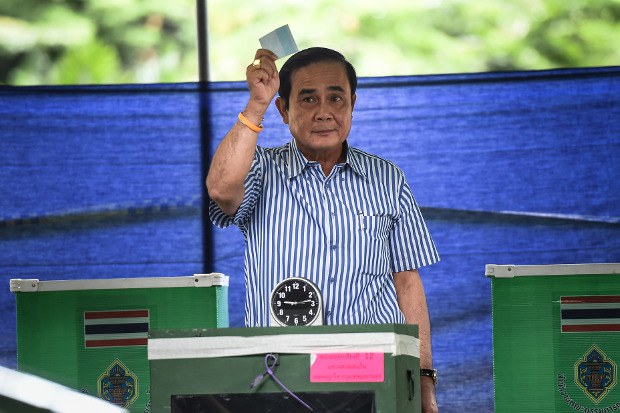Thailand’s Junta Delays Elections – Again
2017.02.08
Bangkok
 Thai Prime Minister Prayuth Chan-o-cha holds up his ballot at a polling station in Bangkok while voting in a constitutional referendum, Aug. 7, 2016.
Thai Prime Minister Prayuth Chan-o-cha holds up his ballot at a polling station in Bangkok while voting in a constitutional referendum, Aug. 7, 2016.
Elections in Thailand won’t take place for another year because the military government needs more time to iron out a new constitution that requires the king’s signature, a deputy prime minister revealed Wednesday.
The postponement marks at least the fourth time the junta has pushed back elections since the military seized power in a bloodless coup in May 2014. Prime Minister Prayuth Chan-o-cha has repeatedly promised that polls would happen as part of a “roadmap” putting Thailand back on a democratic path.
In a testy exchange with reporters in Bangkok on Wednesday, Deputy Prime Minister Wissanu Kreau-ngam repeated that polls would take place about one year from now.
“There will be about one year to the elections, but don’t count 365 days exactly,” the deputy prime minister said.
Wissanu was responding to questions from reporters following a talk he gave on Tuesday evening about Thai legal reforms.
“[T]he elections will not take place shortly. It will take at least a year,” he said then, according to reports.
Elections will have to wait, he told the audience, because of amendments being made to a junta-backed constitution that Thais approved in a referendum last year, Wissanu said.
“We have so many issues that must be done immediately,” he added, referring to proposed amendments to the new constitution that “require feedback from stakeholders.”
Repeated delays
Some of the changes were requested by Thailand’s new king, Maha Vajiralongkorn, after he declined to sign off on the draft charter in January – as required by law for enacting a new constitution.
The draft constitution, which passed in a referendum in August, seeks an appointed senate with seats reserved for military commanders, limits on parliamentary authority, enhanced powers for non-elected state agencies and a provision for a non-elected prime minister.
The king, who took the throne in December following the death of his 88-year-old father, King Bhumibol Adulyadej, asked the National Assembly to make changes that would widen his powers as monarch, such as being able to rule the country while spending long periods abroad.
A revised version of the draft charter would be presented to the new king before Feb. 18, Wissanu said.
After the king sent back the draft charter last month, Prayuth assured the Thai people that tweaking the constitution to satisfy the monarch would not affect elections planned in 2017.
Soon after the junta came to power, it promised that elections would take place within 15 months – by August 2015 at the latest. But in May 2015, Prayuth said elections wouldn’t happen till September 2016, and that would depend on whether the new constitution passed in a referendum.
Then, in September 2015, the PM announced that elections would be pushed back by nearly two years and would happen in the second half of 2017.
“The government will act as quickly as we can [to organize national polls] as the prime minister does not want to prolong his time in power,” Wissanu said on Aug. 8, 2016, a day after a majority of Thais voted for the new constitution.
And, five days after King Bhumibol died in October, Prayuth said the passing of the monarch who had ruled for 70 years would not delay the junta’s timetable for elections in September or October of 2017.
Rights ‘not absolute’: Thai government
The monarchy is a revered institution in Thailand, where a strict royal defamation law known as Lese-Majeste guards against speech seen as criticizing or insulting royals.
Arrests of suspected violators of the law have soared under the junta.
This week, the U.N.’s special rapporteur on free speech, David Kaye, slammed Thailand’s military rulers for “using lese-majeste as a political tool to stifle critical speech.”
“[T]he fact that some forms of expression are considered to be insulting to a public figure is not sufficient to justify restrictions or penalties,” Kaye said.
And while the junta has not yet delivered on its promise of staging elections, others have criticized it for rounding up and arresting Thais who dare to defy military rule.
On Wednesday, Amnesty International issued a 30-page report detailing how the junta has “criminalized dissent” by targeting dozens of civil society and political activists.
The regime has created “a fearful environment where people cannot speak or assemble peacefully without risking arrest or prosecution,” Champa Patel, Amnesty’s director for Southeast Asia, said in a statement accompanying the report’s release.
Responding to the comments made by the U.N. special rapporteur, the Thai Ministry of Foreign Affairs defended the Lese-Majeste law.
The monarchy “has always been a pillar of stability” in the country, and the law “is not aimed at curbing people’s rights to freedom of expression,” the ministry said Tuesday.
But, it added, “While Thailand supports and values freedom of expression, these rights are not absolute and shall be exercised within the boundary of the law in a manner that does not disrupt public order and social harmony or infringe upon others’ rights or reputations.”







